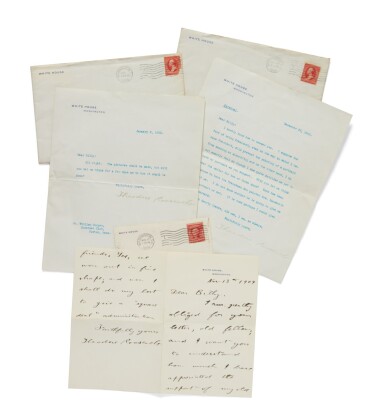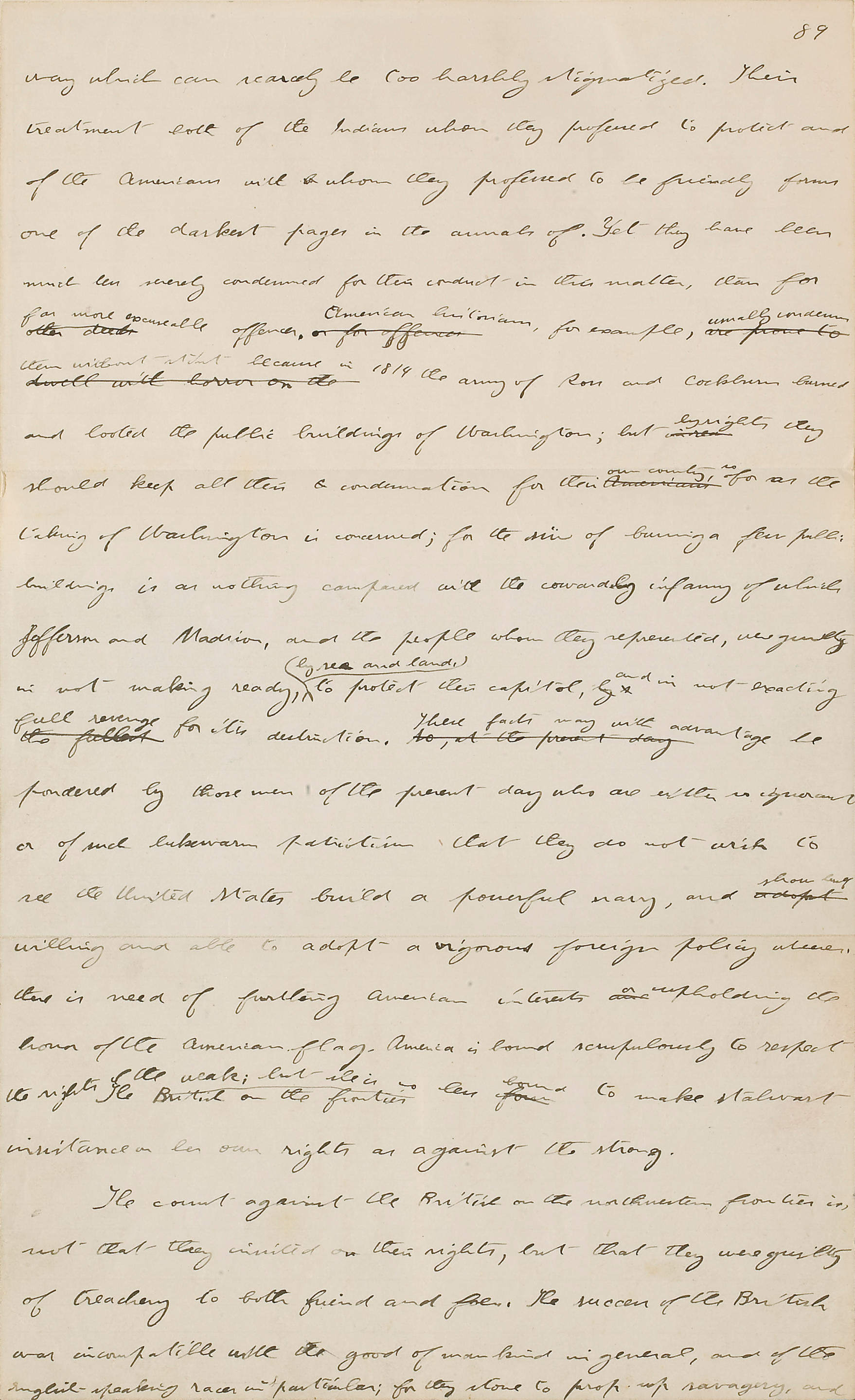ROOSEVELT, Theodore. Autograph manuscript signed ("Theodore Roosevelt"), Khartoum, 15 March 1910. A draft review essay of Sir Harry Johnston's book The Negro in the New World (1910). 13½ pages, folio, in pencil, containing over 2,000 words in Roosevelt's hand. "THERE NEVER WAS A GREATER CRIME AGAINST HUMANITY THAN THE AFRICAN SLAVE TRADE WITH AMERICA" Roosevelt uses the occasion of this review of Sir Harry Johnston's The Negro in the New World (1910) to express a wide range of forceful opinions on the history of slavery and race relations in the U.S., and prospects for equality in the future. He flashes his Southern credentials at the outset, saying: "I am myself half of southern blood; I am the descendant of slave holders--until the day of their death I pensioned two of my southern grandfather's ex-slaves, whom I had never seen, but whom I knew intimately through the stories my mother and her sister had told me of them; and there is still living one such ex-slave who does not need a pension, but who knows she would have it on the instant if she ever did need it." There are a few apologetics. He thinks Johnston did not lay "sufficient stress on the extraordinary difficulty of the situation in which the Southerners found themselves," as they literally inherited a system from their forefathers that was not easily dismantled. He advances the notion that Africans will only improve with greater influx of more Western influences "into the dark continent." But Roosevelt's review is notable for its freedom from the kind of patronizing, racist cant that was so widespread in the social commentary of the day. He gives a ringing endorsement of the principle of human equality and has nothing but contempt for American slavery and the racism that sustained it. "I most heartily join with Sir Harry in his attacks on slavery wherever it existed (he is entirely impartial in making them), and in his thorough exposure of the hideous cruelty and of the degradation it brought even more on the white man who championed it and profited by it, than on the black man who suffered under it...as the evil no longer exists people tend to forget how dreadful it was, and a few people of warped morality tend to speak of it apologetically, or even in guarded praise of it." On the slave trade Roosevelt says: "There never was a greater crime against humanity than the African slave trade with America, nor one which of and by itself, wrought more signal vengeance on the race that perpetrated it." When he quotes Johnston's comment about how schools like Tuskegee would not only improve the status of the black students but weaken racial prejudice of whites, Roosevelt adds: "Surely such ideals are good for any institution of learning whether the students be black or white." Ever eager to make the point for cautious and deliberate reform rather than radical and violent revolution, TR winds up his piece with a long discussion of Haiti, and how the bloody slave rebellion there impeded the cause of emancipation throughout the Americas. In the Caribbean especially, slaveholders postponed what Roosevelt saw as an inevitable process of manumission for fear of a repeat of what happened on Santo Domingo. Johnston's book, he concludes, "should be in the library of every American who cares to devote a little thought to one of the largest of the problems of today." Researching and writing the book proved to be a transforming experience for Johnston, an imperial administrator in British colonies in Africa (especially Uganda). As a colonial official he was a man "deeply dyed in racism, who talked about 'savages' and wrote comic verses about cannibals. However, his outlook was much changed by a journey to the United States and the Caribbean in 1908-9, when he met many distinguished people of African descent. In The Negro in the New World (1910) and in many of his later publications he stressed the importance of treating individuals as equal, regardless of their race" ( Dictionary
ROOSEVELT, Theodore. Autograph manuscript signed ("Theodore Roosevelt"), Khartoum, 15 March 1910. A draft review essay of Sir Harry Johnston's book The Negro in the New World (1910). 13½ pages, folio, in pencil, containing over 2,000 words in Roosevelt's hand. "THERE NEVER WAS A GREATER CRIME AGAINST HUMANITY THAN THE AFRICAN SLAVE TRADE WITH AMERICA" Roosevelt uses the occasion of this review of Sir Harry Johnston's The Negro in the New World (1910) to express a wide range of forceful opinions on the history of slavery and race relations in the U.S., and prospects for equality in the future. He flashes his Southern credentials at the outset, saying: "I am myself half of southern blood; I am the descendant of slave holders--until the day of their death I pensioned two of my southern grandfather's ex-slaves, whom I had never seen, but whom I knew intimately through the stories my mother and her sister had told me of them; and there is still living one such ex-slave who does not need a pension, but who knows she would have it on the instant if she ever did need it." There are a few apologetics. He thinks Johnston did not lay "sufficient stress on the extraordinary difficulty of the situation in which the Southerners found themselves," as they literally inherited a system from their forefathers that was not easily dismantled. He advances the notion that Africans will only improve with greater influx of more Western influences "into the dark continent." But Roosevelt's review is notable for its freedom from the kind of patronizing, racist cant that was so widespread in the social commentary of the day. He gives a ringing endorsement of the principle of human equality and has nothing but contempt for American slavery and the racism that sustained it. "I most heartily join with Sir Harry in his attacks on slavery wherever it existed (he is entirely impartial in making them), and in his thorough exposure of the hideous cruelty and of the degradation it brought even more on the white man who championed it and profited by it, than on the black man who suffered under it...as the evil no longer exists people tend to forget how dreadful it was, and a few people of warped morality tend to speak of it apologetically, or even in guarded praise of it." On the slave trade Roosevelt says: "There never was a greater crime against humanity than the African slave trade with America, nor one which of and by itself, wrought more signal vengeance on the race that perpetrated it." When he quotes Johnston's comment about how schools like Tuskegee would not only improve the status of the black students but weaken racial prejudice of whites, Roosevelt adds: "Surely such ideals are good for any institution of learning whether the students be black or white." Ever eager to make the point for cautious and deliberate reform rather than radical and violent revolution, TR winds up his piece with a long discussion of Haiti, and how the bloody slave rebellion there impeded the cause of emancipation throughout the Americas. In the Caribbean especially, slaveholders postponed what Roosevelt saw as an inevitable process of manumission for fear of a repeat of what happened on Santo Domingo. Johnston's book, he concludes, "should be in the library of every American who cares to devote a little thought to one of the largest of the problems of today." Researching and writing the book proved to be a transforming experience for Johnston, an imperial administrator in British colonies in Africa (especially Uganda). As a colonial official he was a man "deeply dyed in racism, who talked about 'savages' and wrote comic verses about cannibals. However, his outlook was much changed by a journey to the United States and the Caribbean in 1908-9, when he met many distinguished people of African descent. In The Negro in the New World (1910) and in many of his later publications he stressed the importance of treating individuals as equal, regardless of their race" ( Dictionary














.jpg)
Testen Sie LotSearch und seine Premium-Features 7 Tage - ohne Kosten!
Lassen Sie sich automatisch über neue Objekte in kommenden Auktionen benachrichtigen.
Suchauftrag anlegen